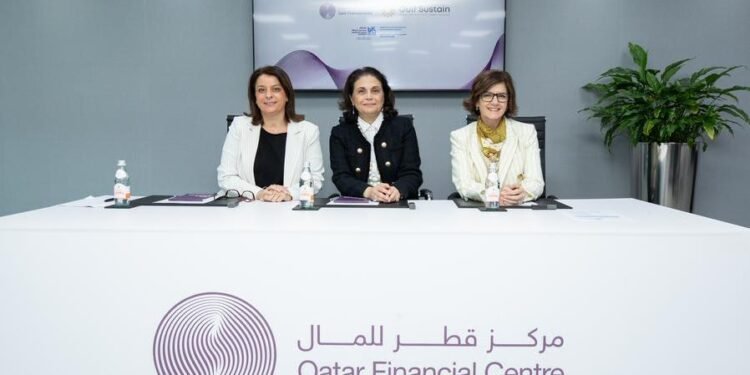
Doha – Qatar: The Employment Standards Office (ESO) of the Qatar Financial Centre (QFC), a leading onshore financial and business centre in the region, hosted a Strategic Dialogue themed “The Importance of Just Transition and Investment in Human Capital to Promote Equality and Inclusivity of Labour Practice”. The initiative, organised in cooperation with Gulf Sustain, a programme supported by the Swiss Agency for Development and Cooperation and UNESCO Chair on Environmental Law and Sustainable Development, aimed to raise awareness of the role of human capital in the Environmental, Social, Governance (ESG) and Just Transition.
The inaugural session of the Dialogue explored the concept of Just Transition, which emphasises the necessity of addressing both environmental and social concerns in the transition to a more sustainable economy. It focused on championing the role of the private sector in inclusive and equitable transition planning.
During the discussions, distinguished experts and representatives from the QFC, Gulf Sustain, the International Labor Organisation (ILO), the UNESCO Chair on Environmental Law and Sustainable Development and the United Nations (UN) Working Group on Business & Human Rights analysed ‘Just Transition and Environmental, Social and Governance (ESG) Frameworks through the Social Lens’. They shared invaluable insights into ESG and the broader social implications of economic transitions towards more sustainable economies, emphasising the critical role of fairness, equity, and inclusivity for workers.
Yousuf Mohamed Al-Jaida, Chief Executive Officer, QFC, commended the initiative, stating, “This event exemplifies the QFC’s commitment to the UN Sustainable Development Goals and contributing to a future where progress goes hand in hand with inclusivity and sustainability. These values are ingrained in our strategic vision, and through initiatives that promote fairness and environmental stewardship, such as this Dialogue, we aim to take significant steps towards a brighter, more equitable tomorrow.”
Damilola Olawuyi, the UNESCO Chair on Environmental Law and Sustainable Development at the Hamad Bin Khalifa University, emphasised the importance of tailored capacity development, reskilling and training initiatives to effectively leverage the opportunities provided by ongoing technology transformation and digitalisation. He added, “The ongoing transition raises the need for skilled, talented and motivated workforce capable of supporting a knowledge-based economy. By prioritising training and capacity building programmes, companies can be better prepared to align their practices and decision-making to advance the United Nations Guiding Principles on Business and Human Rights, as well as the Qatar National Vision 2030. This Dialogue is an important step in this regard, and we look forward to building on its evident success.”
Carlotta Ferrero, Head of Gulf Sustain, stressed the need to frame discussions on what constitutes a just transition within the wider local and global contexts, stating, ‘‘An inclusive and all-society approach is necessary for making the just transition a reality for all, including vulnerable workers. Private sector companies must navigate transition processes in response to their specific contexts and sectors, using existing tools and frameworks such as ESG. Doing so requires us to unpack how the E and the S relate to each other, where progress on one can further the other. Events including this Dialogue give private sector companies an opportunity to reflect on their progress, exchange knowledge across industries, and strive to do better in the future.’’
Max Tuñón, Head of the ILO Doha Project Office, pointed out that “More than ever, the private sector has a vital role to play in transforming economies, safeguarding the environment, and ensuring human dignity in the workplace. We commend the efforts being made by QFC to champion new standards and practices, including due diligence within procurement processes. By giving more priority to sustainability and decent work, companies can contribute to the preservation of our planet and also promote social justice.”
Luigia Ingianni, ESO Commissioner, QFC, highlighted the importance of promoting decent work and ensuring just transition towards a more sustainable world of work to economic development and the creation of more sustainable societies. She said, “As the world embraces sustainability, the call for conscientious and inclusive approaches to transition becomes increasingly urgent. This Dialogue serves as a platform to delve deep into the importance of balancing economic progress with social equity and environmental stewardship. Through collaborative dialogues and actionable insights, we aim to pave the way for responsible transitions that prioritise the needs of workers and communities, embrace diversity, and uphold ethical governance principles.”
The QFC is an advocate for labour policies that stimulate competitive businesses and cultivate engaging work environments. It established the Employment Standards Office as an independent and impartial institution tasked with administering and enforcing the QFC Employment Regulations and overseeing all employment matters within the QFC.
ABOUT THE QATAR FINANCIAL CENTRE
The Qatar Financial Centre (QFC) is an onshore business and financial centre located in Doha, providing an excellent platform for firms to do business in Qatar and the region. The QFC offers its own legal, regulatory, tax and business environment, which allows up to 100% foreign ownership, 100% repatriation of profits, and charges a competitive rate of 10% corporate tax on locally sourced profits. The QFC welcomes a broad range of financial and non-financial services firms.
For more information about the permitted activities and the benefits of setting up in the QFC, please visit www.qfc.qa
@QFCAuthority | #QFCMeansBusiness
MEDIA CONTACT
QFC Corporate Communications
Rasha Kamaleddine
E. r.kamaleddine@qfc.qa









